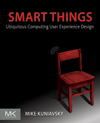Manifestos are a dangerous thing for the author. On the one hand, you risk saying the obvious in a militant way that shows your naivety. On the other, you risk an incomprehensibility that shows how out of touch you are. In either case, you risk your credibility as someone who can be reasoned with about a topic.
That said, here's my
Smart Furniture Manifesto, version 1
- Furniture will be smart
- Smart furniture is better than dumb furniture
- Furniture must become smarter NOW
- People prefer smart furniture to dumb furniture
- Desks, chairs and partitions will soon become as quaint as vanities and Murphy beds
- Office and kitchen furniture will become smarter first, followed by the bed
- Cars are furniture. The smartest piece of furniture today is the car
- Smart furniture replaces springs and levers with electronics and motors
- The Aeron is an abomination of 19th century industrial thinking, even if it's comfortable
- Smart furniture must embrace information like dumb furniture embraced manufacturing
- YOU, furniture designer, stop bending metal and start soldering!
I genuinely believe that these statements are true and I will be acting accordingly.




A good use of a ’smart’ bed would be for people with sleeping disorders, insomnia for example. But on a whole I think it’s the simple things in life that work and stay around for longest.
The KRD stuff is great! Thanks!
KRD are a London based design firm made up of a couple of RCA graduates. They did Commes de Garcon's Paris store back in 2001 where one of the rooms have shiny red cubes/stools that display autonomous behaviour.
Their URL is http://www.krd-uk.com/krd.html
I'm not at all sure that even were such concerns resolved I still wouldn't prefer the Eames chair.
These relationships - even assuming relatively static unresponsive componentry - can be changed by the user at will, and with remarkably little effort comparable to reconfiguring other things, like a blog. The same goes double for flexible screens and partitions.
A browser used in bed is not smart furniture (to me) because it's not extending the core functionality of the bed. Likewise, a computer embedded in a fridge door doesn't make the fridge smart, it just adds some cargo.
Is a web browser smart furniture? What if it fits into a screen attached to your laptop while you are in bed?
Smart furniture isn't a back scratching, vibrating, remote control holding recliner. It is an interactive, need fulfilling futuristic ice skating rink of the imagination.
So what you're really jonesing for is some sort of utility fog?
I'd like to pick a bone with a few of your theses, here, o esteemed Kuniavsky.
1. Desks and chairs will *not* become obsolete anytime in the near future because you can't (or really shouldn't, anyway) consider them as isolated objects, but rather as a system with components in relationship to each other. These relationships - even assuming relatively static unresponsive componentry - can be changed by the user at will, and with remarkably little effort comparable to reconfiguring other things, like a blog. The same goes double for flexible screens and partitions.
I may be reading you incorrectly in thinking you're calling for this, but there's a reason why every single piece of office furniture I'm aware of that has ever attempted to integrate the seating and worksurface has failed. Even the less egregiously swoopy and Mr.-Sulu-you-have-the-conn-looking efforts inscribe one particular relationship between a (seated) user and a (horizontal) surface - not good socially, not good biomechanically.
2. The Murphy bed in our Vicente house is brilliant. If there's a reason Murphy beds "should" be quaint, I'm unaware of it.
3. Dumb furniture (e.g. an Eames Aluminum Group lounge chair, http://www.ultimatebackstore.com/ultimatebackstore/alum-lounge-otto.html) is easier to maintain than a unit which maintained twelve flavors of realtime bio- psycho- and sociometrics and adjusted my posture accordingly. I'm not convinced that TCO concerns wouldn't militate decisively for the former in the near term, and I'm not at all sure that even were such concerns resolved I still wouldn't prefer the Eames chair.
Finally, you can still enjoy dumb furniture in a blackout.
I like your furniture manifesto however I really like you older manifesto thoughts at http://hotwired.lycos.com/webmonkey/98/34/index1a_page13.html
/michael.
galen cranz is very cool -- a sociologist who's an architecture professor at berkeley, and has been for 30 years.
the easiest thing for me to agree with right off is the fact that cars are furniture. they're furniture, they're bunches of furniture incorporated into little capsuled environments.
but is smart furniture really better than dumb furniture? and if objects can be intelligent and networked, is it really needed? consider the sensing beds project by liz goodman. in a sense, it's lyrical. it's smart -- so smart it knows what someone is doing who's far from me, and can communicate it to me. and it also skirts the boundary of creepy.
i think i would like to ascribe animism to certain objects and things when i want to, but i don't want them communicating with me. call it murphy-bed quaint. then again, a murphy bed's a pretty cool idea.
The bean bag's not actually a bad proto. It certainly pays more attention to and is more responsive to the needs of the body, which seems to be what Mike's getting at. Unlike that Aeron you've probably never properly adjusted, certainly not with the frequency the shifting needs of your back, arms, and neck require. Dave.
Required reading: part 2 of "The Chair" by Galen Cranz, "What's wrong with the Chair?" (Props to Courtney "Future Furniture Designer" Skott for the pointer.)
Let me suggest that just as guns don't kill people, people kill people, furniture is not dumb, people are dumb. Chairs are 99% bad - people weren't designed to sit in most chairs, we should go back to squatting, although you can have my Aeron, when you pry it from my cold dead ass. Additionally, the Murphy bed is a great space saver and closer to smart than most.
The bean bag chair. Now that was smart furniture!
Okay, so remind me again why smart furniture is better than dumb furniture?
I mean, if you take it to your animist extreme, I guess it could be kinda cool. We'd all live in houses full of friendly pets that let you sit on them.
But that's assuming that the furniture really is smart (intelligent), not just "smart" (marketing buzzword). And the nice thing about a chair is how simple it is. Think of how easy it is to fix a broken chair. I don't relish the idea of having to reboot my dining room table, or upgrade my fridge before it will give me a beer. Also, I don't really want my furniture spying on me for the man, thank you very much.
So, am I a hopelessly backward Luddite, or do I just not understand what you mean by "smart"?
Cas
And what is the connection between furniture and information? Other than you can't really put a computer anywhere except on furniture.
Oh, and the Microsoft/La-Z-Boy Explorer E-cliner is not smart furniture. Not just because it's a silly idea, but because it's essentially an airplane seat--cupholder, tray table and all. It processes no information to help its user in any way.
Here's a review:
http://www.pcworld.com/reviews/article/0,aid,48345,00.asp
Plus, it's a bad idea.
The manifesto is my definition of smart furniture. OK, if you want something more akin to a dictionary definition, here's one: Smart furniture is furniture that uses the information technological advances of the last 30 years to make furniture more functional and elegant.
I defer to the dictionary for the general definition of "furniture."
What is smart furniture?